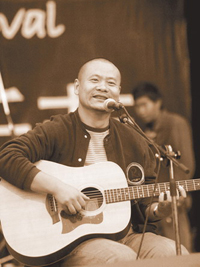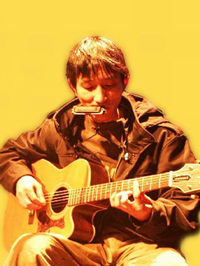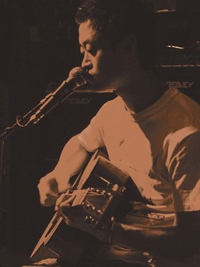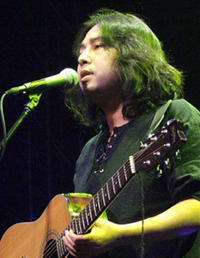|

Folk singer Dongzi
|
Five years ago, Beijing folk music was widely known yet earned little popularity. Folk songs at that time were mainly discovered by word of mouth, but recently folk singers have seen demand drastically rise for their appearance at concert performances.
It is difficult to determine exactly when Beijing folk music began its journey into the mainstream. Some believe it started with Campus Folk Songs issued in the early 1990s by a small company called "Earth." This compilation featured twenty years of popular songs previously considered to be background music, and replaced poems with guitars as the university students' chosen instrument for expression of their feelings. However, popular as the tenderness and romance of folk music was, China's youth couldn't resist the sweeping rock and roll rage that dominated Beijing bars in the 1990s.
Entering into the 21st century, new folk music began to make its mark on history. In 2001, "River Bar" was established; the best performers of "River Bar", Xiaohe and Wan Xiaoli recorded a live show in 2002; Zhou Yunpeng released his album Mazy and Silent Breath in 2004; Wan Xiaoli replaced Zhang Chufu to act as the distinguished guest of a performance in 2005; in 2007 singers like Wan Xiaoli, Su Yang, and Zhou Yunpeng appeared at almost all music festivals, both big and small, and their names were even on the list of the most popular music stars.
However, as folk music becomes increasingly more popular, people worry about what they see as the inevitable commercialization of an art form.
|

Folk singer Zhao Muyang
|
Infinite possibilities are just beginning
Campus ballads enjoyed a short prosperity in the middle of the nineteenth century, during which commodity society was experiencing a boom in China. However, the musical language of the ballad didn't truly attain independence until after the year 2000.
Trend toward folk songs
The most distinguished representatives who have combined ballads with national music are Zhang Shuan and the feral child band led by Xiao Suo. Influencing many other artists, they set an example by taking inspiration from western folk songs and exploring new forms of folk music. Zhuang Shuan, Xiaosuo, and their friends launched a bar in March 2003.
Su Yang, who is one of the pioneers of rock music in Ningxia, later switched his focus to processing and exploring folk songs. In addition, Zhao Muyang, also from Ningxia, has integrated western songs and styles formerly in vogue with his singing.
Popularity
Wan Xiaoli, who has deep roots in popular music and rock music, has been greatly influenced by popular music in Hong Kong and Taiwan and ballads on the mainland. Another mainstream ballad representative is Zhou Yunpeng, who is a wandering singer and also a blind poet. His work named Chinese Children, classified in the category of critical realism, triggered a sympathetic response from a wide range of people.
Alternative folk music
Hu Ma is a representative of the alternative ballad, and creates music similar to artists like Weird Folk and Free Folk in America and Europe. The most outstanding representative is Xiao He, whose music differs greatly from countryman Wan Xiaoli.
The following are interviews with three folk singers featured in Southern Metropolis Weekly (SMW):
|

Folk singer Wan Xiaoli
|
Wan Xiaoli was born in Cixian County, Hebei in 1971. He signed a contract with the "Badhead" label under The Modern Sky Company in July 2002 and released his first live show album Walking Around in December that same year. In December 2005 he signed with the "Thirteenth Month" Net-show label. He is a representative of Chinese folk singers, with a background in classical guitar.
SMW: In your opinion, why has folk music become so popular?
Wan: The attraction of folk songs is that they are better than popular songs. They are different from rock and roll; they are far-reaching and born of one of the most basic music styles that can develop into other kinds of music.
SMW: What do you think of the conditions and prospects for China's folk music?
Wan: China's folk music is very good because it is diverse, allowing people to hear different voices. Now folk music has attracted the attention of a group of people. Folk songs are warmly welcomed at the Snow Mountain Music Festival. Currently there are a large number of folk songs but only the best will last.
|

Folk singer Xiaohe
|
Xiaohe's full name is He Guofeng, born in Handan, Hebei in 1975. As a folk singer, action artist, and the soul of the band "Fantastic Pharmacy," he has written many heart-stirring, creative, and unique folk songs. Each of his performances pleasantly surprises fans, who have affectionately dubbed him a "music wizard."
SMW: How is the current folk music market?
Xiaohe: Folk music has captured wide attention in recent years, but because of today's depressed record industry, many songs haven't been heard by the public. I expect to hear more creative and individualistic folk songs in years to come.
SMW: What do you see in the future for folk music?
Xiaohe: No matter how excellent the performance is and no matter how passionate a performer is he has to answer the final curtain call. I believe today's folk music will inspire the coming generations and sow the seeds of our native folk music.
|

Folk singer Hong Qi
|
Hong Qi was born in Hetian, Xinjiang in 1973, and started creating music in 1992. He was one of the pioneers of China's new folk music movement and one of its most active practitioners.
SMW: Describe folk music through your eyes. What are its charms?
Hong Qi: My understanding of folk music is that it is the music of the folks. It is inspiring, healthy, and optimistic and it refuses decadence. But on the other hand, it is very rebellious and defiant. Under conditions where life is suppressed and tortured, outrage and sadness are extremely strong. So its charms are everywhere and cannot be matched by the trivial sadness and feelings of popular music.
SMW: What do you think will happen with folk music in the future?
Hong Qi: Both the hot Taiwanese folk music and phenomenal new Beijing folk music have been very active recently. I believe that the fantastic folk music will forever shine and warm people's hearts like the rising sun.
(China.org.cn by Zhang Ming'ai & Yang Xi, October 30, 2007)






